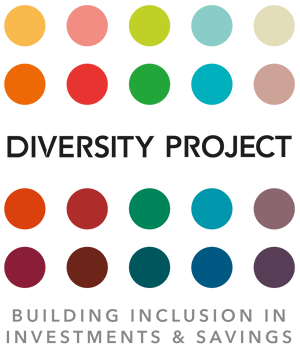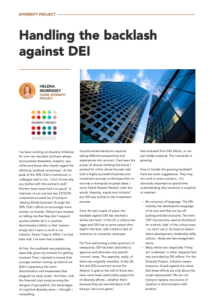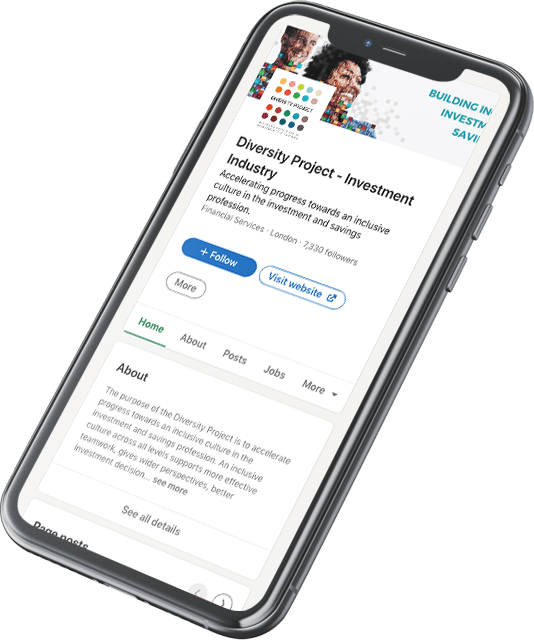No more shoulder tapping: An interview with Sophie Hulm
Sophie Hulm is CEO of Progress Together, a not-for-profit membership body that spun out of a UK government taskforce on socioeconomic diversity. It aims to level the playing field in UK financial services.
Driven by a strong personal connection to social mobility and infectious passion for the cause, her perspective is both refreshing and laser sharp. She rarely misses a beat and provides clear-eyed answers to what can be a confusing and complicated topic.
- What motivates you to try to make finance more socially mobile? Do you have a personal connection to the social mobility cause, and if so, could you share it for our readers?
I’ve always felt a deep sense of injustice. Even as a child, I wondered why some people get all the opportunities. My dad is a working-class East Londoner who had various jobs, from being a security guard to working at sea. The closest he’s been to the City is selling newspapers in Liverpool Street station when he left school at 15. He taught me an important lesson: fight for those without power. My mum is a retired academic whose own mum fled war-torn Poland and ended up in an orphanage in Africa, eventually the UK. Life is hard for so many people, but it often has more to do with the circumstances in which they were born than how good, kind, hardworking or clever they are.
- Getting in and getting on are very different things, aren’t they? Can you explain why Progress Together was set up, and what you hope it will achieve?
Progress Together was set up by a Government-commissioned taskforce in response to evidence from the Bridge Group. We found that working-class employees progressed 25% slower than peers, with no link to job performance. Quite rightly, industry and Government felt this has implications for access to talent and productivity.
Employers are doing a great job of accessing diverse junior-level talent, but so few reach middle management and beyond. The research showed that 47% of junior talent was from higher socio-economic backgrounds compared with 89% at senior levels. This shows that people from working class backgrounds are getting in but not moving up. Not only are we wasting resources and effort in attracting diverse talent that doesn’t progress, but we are setting people up to fail.
- Much is made of the business and moral cases for socioeconomic diversity in the workforce. Which one resonates more with you?
The moral case to me is obvious. Of course, we want people who perform well to progress. We also want our employees to feel a sense of belonging. That goes without saying. But to me, the business case is what needs to be highlighted. That’s why Andy Haldane, former Chief Economist of the Bank of England published the business case as Co-Chair of the Government-commissioned taskforce.
As former Head of Skills at the City of London, I can see a very real link with the cost of wasted talent. This year saw the highest-ever rate of job vacancies within financial services. If high-performing employees are leaving the sector due to a lack of progression, this should be a concern to anyone in charge of their company’s talent strategy. The class pay gap in financial services is four times higher than the tech sector, yet these are the very skills we need for the future. If we want to attract and retain the best talent, we have to act.
Of course, there are opportunities, but there is also risk, as identified by the regulators. The FCA/PRA diversity and inclusion consultation makes it clear that homogeneous teams with limited socio-economic diversity may be more prone to groupthink and cognitive biases. This can lead to poor decision-making, as individuals with similar backgrounds and experiences may overlook important perspectives and risks. Embracing socio-economic diversity data can lead to a more resilient and adaptable organisation that fosters a culture of innovation, adaptability, and creativity, which can be essential for long-term sustainability in a rapidly changing business environment.
- What would you say to people who argue that we live in a meritocracy?
The evidence blows this myth out of the water. Progression and hiring are heavily influenced by traits that have little or no correlation with job performance. For example, pre-existing networks from education or family, perceived confidence or gravitas, and an understanding of the unwritten rules of the game.
In law, evidence shows that state-educated employees are 75% more likely to be in the top decile of performers compared with privately educated peers. Yet, we see time after time, that it is those that fit with the dominant culture who are the ones that get ahead. At best, this is a waste of energy and resources, at worst, the sector is failing to benefit from high performing talent. If we want to remain globally competitive, we must be led by job performance, not notions of perceived ‘fit’.
Social mobility is a classic ‘wicked’ problem and manifests on many levels, requiring different messages for different audience segments. How do you approach this communications challenge?
To make systemic change we must stop trying to ‘fix’ the people. We know that employees from working class backgrounds perform just as well as peers. To bring about long-lasting change we need to ‘fix’ the processes. We need to ensure all employees have access to senior sponsors, we need to ensure all employees have access to the visible/profile-raising projects, and that all high-performing employees can access the promotion round. No more taps on the shoulder.
We need to think about this as any other change management programme. First, employers need to articulate the need for change (maintaining the status quo is not sufficient). We know that gaining initial buy-in will remove friction and resistance later. Then, employers need to develop the plan. Where are you now, where do you want to get to and how will you get there? Who will be involved, and how will you measure success? Then implement the change and embed it into company culture and processes, talk about the new way of being repeatedly, and reward acceptance of the change. Different people are driven by different things.
- What are the main the things that individuals who are passionate about this subject should be aware of?
This is a long-term goal. We will not change the sector overnight but, with focused efforts, we can change it. The first port of call should be knowing the starting point. Progress Together members are leading the way here. They should be congratulated for collecting data on workforce socio-economic data, which when combined represents 14% of the UK financial services workforce. But, we now need firms from all sub-sectors, including private equity, investment banking and wealth management to join the campaign and commit to improving the industry for everyone working in it.
We know greater workforce socio-economic diversity fits squarely within the ‘S’ in the ESG. But to evidence this to investors, standards setters, regulators and clients, the sector needs more data. Of course, data is a means to an end and not the end itself. At Progress Together we are working towards parity. We want socio-economic diversity at senior levels (ExCo and two levels down) to mirror socio-economic diversity across the rest of the workforce. To get there, we have outlined recommendations in our latest report.
What kind of support and resources do Progress Together offer members and non-members?
Our membership currently represents a third of the financial services sector, and we are growing. We support our member firms to work together as a sector, collect and publish data and hold leadership accountable for delivering improved socio-economic diversity.
We help our members to model what ‘good’ looks like, through a five-point pathway:
- Leadership – assigning clear accountability and responsibility
- Data – collecting and assessing employee socio-economic background data
- Taking action – acting and monitoring which methods are effective
- Setting goals – implementing targets set internally, taking into account parameters such as subsector and size
- Publish – presenting and publishing data and sharing what activities worked
In 2023 we launched the first phase of our toolkit, which offers our members a step-by-step guide to building a more socio-economically diverse workplace. An ever-evolving tool, this continues to be developed, expanded and built on, based on what our members tell us they need.
The member-only toolkit includes templates and how-to guides on all aspects of the diversity journey, from talent acquisition and collecting data to influencing leadership and measuring impact.
We also provide opportunities for our members to work together across the sector, through in-person workshops, peer-to-peer networking, exclusive webinars and a host of resources that are not publicly available.
We know that data is huge issue when trying to improve DEI outcomes, and social mobility is no different. Could you offer any advice on the best places to start and how firms should effectively approach the challenge and break the data down to find the details behind the sometimes dangerous headline numbers?
Our members work with our trusted data partner the Bridge Group to learn what data to collect and how to maximise response rates. Each year we analyse this data to track progress and assess which interventions are evidenced to work.
This year, the research highlighted important relationships between socio-economic background, gender and ethnicity. White men from higher socio-economic backgrounds are 30 times more likely to be found in senior positions than working-class women from ethnic minority backgrounds. Women typically experience the negative effects of being from a lower socio-economic background more significantly than men – who are more often able to use their working-class roots as an asset in the workplace. The more data we have, the more we can read between the headline statistics.
What is the one thing you wish your former self knew? What one piece of advice would you go back and give?
That drive and determination gets you a long way.




